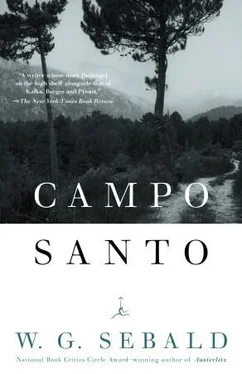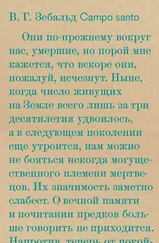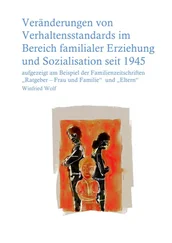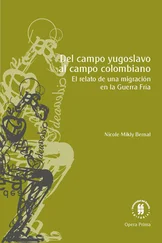Although in some of its amplifications Nossack’s text goes beyond the plain facts of what happened, veering into personal confession and mythically allegorical structures, it may be understood in its entirety as a deliberate attempt to give as neutral as possible an account of an experience exceeding anything in the artistic imagination. In an essay of 1961 where Nossack speaks of the influences on his literary work, he writes that after reading Stendhal he was anxious to express himself “as plainly as possible, without well-crafted adjectives, high-flown images or bluff, more like someone writing a letter in almost everyday jargon.” 28This stylistic principle proves its worth in his depiction of the ruined city, in that it does not allow traditional literary methods, which tend to homogenize collective and personal catastrophes; Mann’s novel Dr. Faustus is the contemporary paradigm. In direct contrast to the traditional approach to writing fiction, Nossack experiments with the prosaic genre of the report, the documentary account, the investigation, to make room for the historical contingency that breaks the mold of the culture of the novel. Where Kasack’s book about the city beyond the river, which in its opening passages also tries to maintain the neutrality of an impersonal report, very soon lapses into features like those of fiction, Nossack manages to preserve, over long tracts of his work, the documentary tone that set an example for the later development of West German literature. If familiarity with social and cultural circumstances is the crucial prerequisite for both writing and reading novels, then the attitude of an agency that simply presents a report conveys a sense of reality that appears foreign. That is evident in Nossack’s prose work Bericht eines fremden Wesens über die Menschen (“Account of Mankind by a Strange Creature”), which is also associated with the themes described above and ascribes to the narrator the “strangeness” in the title, but asks the reader whether the reason for the strangeness is not a mutation in mankind that makes the author an anachronistic figure. The wide distance between the subject and object of the narrative process implies something like the perspective of natural history, in which destruction and the tentative forms of new life that it generates act like biological experiments in which the species is concerned “to break its mold and abjure the name of man.” 29As the first sentence of his account tells us, Nossack witnesses the fall of Hamburg as a spectator. Shortly before the air raid on the city of July 21, 1943, he had gone to spend a few days in a village on the Lüneburg Heath fifteen kilometers south of its outskirts. The timelessness of the landscape reminds him “that we come from a fairy-tale and shall return to a fairy-tale again,” which in the circumstances suggests not so much the idylls of Hermann Löns (the poet of that area) as the precarious achievements of the technological civilization that was shortly to return large parts of the population to the hunter-gatherer stage of development. 30From the heath, the approaching destruction of the city appears like a natural spectacle. Sirens howl “like cats somewhere in distant villages,” the sound of the bomber squadrons coming in hovers in the air “between the clear constellations and the dark earth,” the shapes like “fir trees” dropping from the sky resemble “red-hot drops of metal flowing” down on the city, until they later disappear in a cloud of smoke, “lit red from below by the fire.” 31The scene thus suggested, still containing aestheticized elements, already shows that a “description” of the catastrophe from its periphery rather than its center is possible. If Nossack’s text conveys only a reflection of the inferno, his own real evidence begins when the raid is over and the extent of the destruction is gradually revealed to him. Even before his return to Hamburg, he is amazed by the “constant coming and going” that begins with the firemen hurrying to the city’s aid from nearby towns, and continues “on all the streets of the region around … by day and by night” during the throng’s “flight from Hamburg, no one knew where. It was a river for which there was no bed; almost silently but inexorably deluging everything, carrying disquiet along little rivulets and into the most remote villages. Sometimes fugitives thought they could cling to a branch and so get a footing on the bank, but only for a few days or hours, and then they threw themselves back into the torrent to let it carry them on. None of them knew that they carried restlessness with them like a sickness, and everything it touched lost its firm foundation.” 32Later Nossack comments on his impression that the journeying of the countless throng of people who were daily on the move was by no means necessary “to salvage something or keep an eye open for relatives.… Yet I would not like to call it mere curiosity. People simply had no central point … and everyone was afraid of missing something.” 33The aimlessly panic-stricken conduct of the population reported here by Nossack corresponds to no social norms and can be understood only as a biological reflex set off by the destruction. Victor Gollancz, who in the autumn of 1945 visited several cities in the British-occupied zone, including Hamburg, in order to make firsthand reports which would convince the British public of the necessity of rendering humanitarian aid, notes the same phenomenon. He describes a visit to the Jahn Gymnastics Hall, “where mothers and children were spending the night. They were units in that homeless crowd that goes milling about Germany ‘to find relatives,’ they said, but really, or mainly, I was told, because a restlessness has come over them that just won’t let them settle down.” 34The extreme restlessness and mobility to which Gollancz testifies were the reactions of a species seeing itself cut off from its ways of escape, which biologically speaking always lay ahead of it, and as preconscious experience those reactions affected the new social dynamic developing out of the destruction. Böll, who understood the constant movement associated with the war as a very specific aspect of human misfortune, with peacefully settled populations returning to the nomadic way of life, ascribes the postwar West German liking for speed, and the passion for travel which sends people out of the country every year in great droves, to the experiences of a historical period when whole social groups were removed from the last secure factor in their lives, the places where they lived. 35Literature tells us very little more about the archaic behavior that broke through in this way. Nossack does indicate that “the usual disguises” of civilization fell away as if of their own accord, and “greed and fear showed themselves naked and unashamed.” 36The reversion of human life to the primitive, starting with the fact that, as Böll remembered later, “this state began with a nation rummaging in the trash,” is a sign that collective catastrophe marks the point where history threatens to revert to natural history. 37In the midst of the ruined civilization, what life is left assembles to begin at the beginning again in a different time. Nossack notes how unsurprising it seems “that people had lit small fires in the open, as if they were in the jungle, and were cooking their food or boiling up their laundry on those fires.” 38There is not much comfort, however, in the fact that in Nossack’s account the city, now reduced to a desert of stone, soon begins to stir, that trodden paths appear across the rubble, linking up — as Kluge remarks—“to a faint extent with earlier networks of paths,” for it is not yet certain whether the surviving remnants of the population will emerge from this regressive phase of evolution as the dominant species, or whether that species will be the rats or the flies swarming everywhere in the city, instead. 39The revulsion at this new life, at the “horror teeming under the stone of culture” to which Nossack gives expression in one of the most terrible passages of his text, is a pendant to the fear that the inorganic destruction of life by the firestorm which (according to Walter Benjamin’s distinction between bloody and nonbloody violence) might yet be reconcilable with the idea of divine justice, will be followed by organic decomposition caused by flies and rats 40to which in Kasack’s book, too, the river drawing the line between life and death “forms no barrier.” 41Writing from such an extreme situation required a redefinition of the author’s moral position, which for Nossack can be justified only by the necessity of rendering accounts or, as Kasack puts it, the need “to note certain procedures and phenomena before they fall into oblivion.” 42In such conditions writing becomes an imperative that dispenses with artifice in the interests of truth, and turns to a “dispassionate kind of speech,” reporting impersonally as if describing “a terrible event from some prehistoric time.” 43In an essay on the diary of Dr. Hachiya from Hiroshima, Elias Canetti asks what it means to survive such a vast catastrophe, and says that the answer can be gauged only from a text which, like Hachiya’s observations, is notable for precision and responsibility. “If there were any point,” writes Canetti, “in wondering what form of literature is essential to a thinking, seeing human being today, then it is this.” 44The ideal of truth contained in the form of an entirely unpretentious report proves to be the irreversible foundation of all literary effort. It crystallizes resistance to the human faculty of suppressing any memories that might in some way be an obstacle to the continuance of life. The outcast, says Nossack, “dared not look back, since there was nothing behind him but fire.” 45For that very reason, however, memory and the passing on of the objective information it retains must be delegated to those who are ready to live with the risk of remembering. It is a risk because, as the following parable by Nossack shows, those in whom memory lives on bring down upon themselves the wrath of others who can continue to live only by forgetting. He writes of survivors sitting around the fire one night: “Then one man spoke in his dream. No one understood what he was saying. But they were all uneasy, they rose, they left the fire, they listened fearfully to the cold dark around them. They kicked the dreaming man, and he woke. ‘I have been dreaming. I must tell you what I dreamed. I was back with what lies behind us.’ And he sang a song. The fire burned low. The women began to weep. ‘I confess, we were human beings!’ Then the men said to each other, ‘If it was as he dreamed we would freeze to death. Let us kill him!’ And they killed him. Then the fire burned hot again, and everyone was content.” 46
Читать дальше












